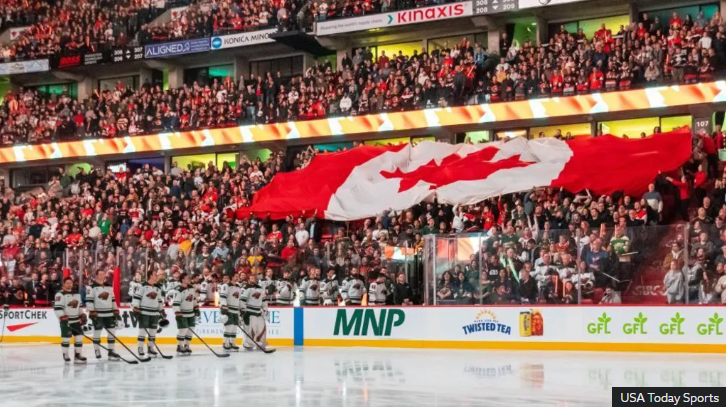
A few hours after President Donald Trump announced steep tariffs on Canada, hockey fans in Ottawa expressed their discontent by booing the Star-Spangled Banner during a National Hockey League game against a visiting U.S. team.
The protest continued on Sunday during a National Basketball Association (NBA) game between the Toronto Raptors and the Los Angeles Clippers, where fans nearly drowned out a 15-year-old singer’s performance of the U.S. anthem.
Rising Tensions Over U.S. Tariffs on Canada
The vocal backlash from typically respectful Canadian fans underscores the nation’s frustration over Trump’s decision to impose punitive tariffs on its closest ally. The new trade measures include a 25% tariff on all Canadian imports into the U.S., with a 10% levy on energy, set to take effect on Tuesday.
Compounding tensions, President Trump has renewed his push for Canada to become the 51st U.S. state, a suggestion once dismissed as a joke but now taken more seriously amid growing economic pressure.
While analysts predict that the tariffs will also drive up costs for Americans on everyday essentials such as gas and groceries, Canada is more vulnerable due to its heavy reliance on U.S. trade. If the tariffs persist, experts warn that Canada could face a severe economic recession.
Canadians Respond with Boycotts and Retaliation
Public anger is mounting, prompting a surge in calls for action. Canadian political leaders, including Prime Minister Justin Trudeau, have urged citizens to support each other through the crisis.
“Many among us will be affected by this, and we will have some hard times. I ask you to be there for each other,” Trudeau said in a Saturday evening address. “Now is the time to choose Canada.”
Across social media, Canadians are sharing guides on how to avoid American-made products. A Toronto grocery store even labeled its Canadian-made yogurt to help consumers make patriotic purchasing decisions, an image of which was shared by local doctor Iris Gorfinkel on X.
Some Canadians are canceling travel plans to the U.S. in protest. On Bluesky, Canadian author Seth Klein wrote:
“Yesterday, in response to Trump tariffs, we cancelled our family March break to the US. Took a small hit on cancelled train tickets, but it needed to be done.”
Meanwhile, Ontario—the country’s most populous province—has announced that American liquor will be pulled off store shelves indefinitely starting Tuesday.
In retaliation, Canada has imposed C$155 billion ($105 billion) in tariffs on U.S. goods, targeting items such as vegetables, clothing, sports equipment, and perfume. Republican-led states like Florida are feeling the squeeze, with orange juice and other regional products being singled out.
A Critical Shift in Canada-U.S. Relations
Trump’s tariffs—widely believed to be a pressure tactic for concessions on border security—have left many Canadians feeling betrayed.
“It’s a shock,” said Michael Ignatieff, former leader of Canada’s Liberal Party. “We’re into a new world, in which the question on whether you can trust America becomes the fundamental question in foreign policy for every country.”
Canadian opposition leader Pierre Poilievre also condemned the tariffs, calling them “massive, unjust, and unjustified.”
Trudeau, in his Saturday speech, questioned why the U.S. is targeting its strongest ally rather than focusing on “more challenging parts of the world.”
An Uncertain Future: Canada’s Economic and Diplomatic Response
The duration of the U.S. tariffs remains unclear, as does the extent of Canada’s response. Trump’s administration has linked the levies to concerns over cross-border fentanyl trafficking and illegal migration.
Economists warn that if the tariffs persist, Canada could enter a recession within six months, with unemployment rising above 7%.
“At the end of the day, we don’t even really know why he’s doing this,” said Theo Argitis, managing director at Compass Rose Group.
While Trump claims that Canada relies on massive U.S. subsidies to remain economically viable, Canadian officials dispute this, emphasizing their country’s long history of economic independence.
With the White House threatening harsher penalties should Canada retaliate, the two nations stand at a pivotal crossroads. However, Trudeau remains firm in Canada’s stance:
“We prefer to solve our disputes with diplomacy. But we are ready to fight when necessary.”
